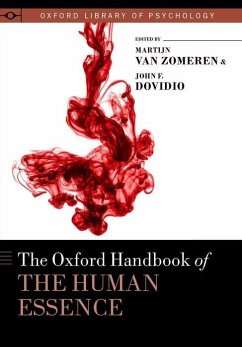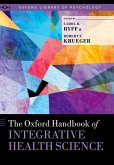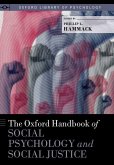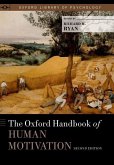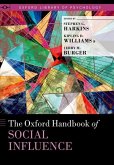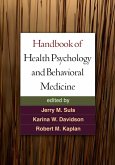The Oxford Handbook of the Human Essence
Herausgeber: Dovidio, John F; Zomeren, Martijn Van
The Oxford Handbook of the Human Essence
Herausgeber: Dovidio, John F; Zomeren, Martijn Van
- Gebundenes Buch
- Merkliste
- Auf die Merkliste
- Bewerten Bewerten
- Teilen
- Produkt teilen
- Produkterinnerung
- Produkterinnerung
Advances in social-psychological theorizing and research suggest that humans can be viewed as biological beings as well as cultural creatures, rational reasoners as well as emotional enigmas, moral minds as well as amoral agents. Edited by Martijn van Zomeren and John F. Dovidio, The Oxford Handbook of the Human Essence expertly articulates both what social psychology can tell us about the human essence, and the astonishing range of perspectives reflectedwithin this field.
Andere Kunden interessierten sich auch für
![The Oxford Handbook of Acculturation and Health The Oxford Handbook of Acculturation and Health]() The Oxford Handbook of Acculturation and Health220,99 €
The Oxford Handbook of Acculturation and Health220,99 €![The Oxford Handbook of Integrative Health Science The Oxford Handbook of Integrative Health Science]() The Oxford Handbook of Integrative Health Science210,99 €
The Oxford Handbook of Integrative Health Science210,99 €![The Oxford Handbook of Social Psychology and Social Justice The Oxford Handbook of Social Psychology and Social Justice]() Phillip L HammackThe Oxford Handbook of Social Psychology and Social Justice193,99 €
Phillip L HammackThe Oxford Handbook of Social Psychology and Social Justice193,99 €![The Oxford Handbook of Human Motivation The Oxford Handbook of Human Motivation]() The Oxford Handbook of Human Motivation182,99 €
The Oxford Handbook of Human Motivation182,99 €![The Oxford Handbook of Social Influence The Oxford Handbook of Social Influence]() The Oxford Handbook of Social Influence220,99 €
The Oxford Handbook of Social Influence220,99 €![Handbook of Health Psychology and Behavioral Medicine Handbook of Health Psychology and Behavioral Medicine]() Handbook of Health Psychology and Behavioral Medicine132,99 €
Handbook of Health Psychology and Behavioral Medicine132,99 €![Pornography and Public Health Pornography and Public Health]() Emily F RothmanPornography and Public Health91,99 €
Emily F RothmanPornography and Public Health91,99 €-
-
-
Advances in social-psychological theorizing and research suggest that humans can be viewed as biological beings as well as cultural creatures, rational reasoners as well as emotional enigmas, moral minds as well as amoral agents. Edited by Martijn van Zomeren and John F. Dovidio, The Oxford Handbook of the Human Essence expertly articulates both what social psychology can tell us about the human essence, and the astonishing range of perspectives reflectedwithin this field.
Produktdetails
- Produktdetails
- Verlag: Sydney University Press
- Seitenzahl: 320
- Erscheinungstermin: 8. Dezember 2017
- Englisch
- Abmessung: 261mm x 185mm x 30mm
- Gewicht: 749g
- ISBN-13: 9780190247577
- ISBN-10: 0190247576
- Artikelnr.: 49206764
- Verlag: Sydney University Press
- Seitenzahl: 320
- Erscheinungstermin: 8. Dezember 2017
- Englisch
- Abmessung: 261mm x 185mm x 30mm
- Gewicht: 749g
- ISBN-13: 9780190247577
- ISBN-10: 0190247576
- Artikelnr.: 49206764
Martijn van Zomeren is Professor of Cultural and Political Psychology of Social Relationships at the University of Groningen in the Netherlands. He received his PhD cum laude from the University of Amsterdam in 2006, received various dissertation awards, early career awards, and grants, and is an international expert on collective action, activism and social change. The main theme in his work is the importance of theoretical integration in the various fields that he has contributed to, as reflected in his 2016 book, published by Cambridge University Press, entitled From Self to Social Relationships: An Essentially Relational Perspective on Social Motivation. John F. (Jack) Dovidio, who received his PhD from the University of Delaware in 1977, is currently the Carl Iver Hovland Professor of Psychology and Public Health, as well as Dean of Academic Affairs of the Faculty of Arts and Sciences at Yale University. His research interests are in stereotyping, prejudice, and discrimination; social power and nonverbal communication; and altruism and helping. His scholarship focuses on understanding the dynamics of intergroup relations and ways to reduce intergroup bias and conflict.
* Preface
* Chapter 1: Introduction: The Human Essence
* John F. Dovidio and Martijn Van Zomeren
* SECTION ONE: INDIVIDUALITY
* Chapter 2: An Existential Psychological Perspective on the Human
Essence
* Daniel Sullivan and Roman Palitsky
* Chapter 3: Masters of Our Universe: The Existential Animal
* Travis Proulx
* Chapter 4: Free Will and the Human Essence: Responsible Autonomy,
Meaning and Cultural Participation
* Roy F. Baumeister
* Chapter 5: Essential Self-Evaluation Motives: Caring About Who We Are
* Aiden P. Gregg and Constantine Sedikides
* Chapter 6: The Tripartite Motivational Human Essence: Value, Control,
and Truth Working Together
* James F.M. Cornwell and E. Tory Higgins
* Chapter 7: People as Penguins: Thermoregulation as Part of the Human
Essence
* Hans IJzerman and Lotje J. Hogerzeil
* Chapter 8: The Obviousness and Obvious Limits of Individuality as
Human Essence
* Martijn van Zomeren
* SECTION TWO: SOCIALITY
* Chapter 9: Prosocial Behavior as a Human Essence
* David A. Schroeder and William G. Graziano
* Chapter 10: The Human Essence in Helping Relations: Belongingness,
Independence and Status
* Arie Nadler
* Chapter 11: Does Aggression Make us Human?
* Joseph A. Vandello and Curtis Puryear
* Chapter 12: Morality and Social Identity
* Naomi Ellemers
* Chapter 13: Justice and Human Essence
* Tom R. Tyler
* Chapter 14: Biology as Destiny or as Freedom? On Reflexivity,
Collectivity and the Realization of Human Potential
* Stephen Reicher
* Chapter 15: Six Social Elements in Search of an Essence
* Roger Giner-Sorolla
* SECTION THREE: CULTURAL EMBEDDEDNESS
* Chapter 16: Talking about Humanness: Is Human Essence Talk a Human
Essence?
* Yoshihisa Kashima
* Chapter 17: Promotion or Preventing Change Through Political
Participation: About Political Actors, Movements, and Networks
* Bert Klandermans
* Chapter 18: Values and the Human Being
* Jan Cieciuch and Shalom H. Schwartz
* Chapter 19: The Relational Essence of Cultural Psychology:
Decolonizing Love and (Well-) Being
* Glenn Adams, Sara Estrada-Villalta, and Tugçe Kurtis
* Chapter 20: Human Essence: Toward a Relational Reconstruction
* Kenneth J. Gergen
* Chapter 21: Human Essences and Cultural Embeddedness: A Gene-Culture
Co-Evolution Perspective
* Ronald Fischer
* Chapter 22: Human Essence in Conclusion: Why Psychology Needs a
Bigger Picture and Some Suggestions on How to Get There
* Martijn van Zomeren and John F. Dovidio
* Chapter 1: Introduction: The Human Essence
* John F. Dovidio and Martijn Van Zomeren
* SECTION ONE: INDIVIDUALITY
* Chapter 2: An Existential Psychological Perspective on the Human
Essence
* Daniel Sullivan and Roman Palitsky
* Chapter 3: Masters of Our Universe: The Existential Animal
* Travis Proulx
* Chapter 4: Free Will and the Human Essence: Responsible Autonomy,
Meaning and Cultural Participation
* Roy F. Baumeister
* Chapter 5: Essential Self-Evaluation Motives: Caring About Who We Are
* Aiden P. Gregg and Constantine Sedikides
* Chapter 6: The Tripartite Motivational Human Essence: Value, Control,
and Truth Working Together
* James F.M. Cornwell and E. Tory Higgins
* Chapter 7: People as Penguins: Thermoregulation as Part of the Human
Essence
* Hans IJzerman and Lotje J. Hogerzeil
* Chapter 8: The Obviousness and Obvious Limits of Individuality as
Human Essence
* Martijn van Zomeren
* SECTION TWO: SOCIALITY
* Chapter 9: Prosocial Behavior as a Human Essence
* David A. Schroeder and William G. Graziano
* Chapter 10: The Human Essence in Helping Relations: Belongingness,
Independence and Status
* Arie Nadler
* Chapter 11: Does Aggression Make us Human?
* Joseph A. Vandello and Curtis Puryear
* Chapter 12: Morality and Social Identity
* Naomi Ellemers
* Chapter 13: Justice and Human Essence
* Tom R. Tyler
* Chapter 14: Biology as Destiny or as Freedom? On Reflexivity,
Collectivity and the Realization of Human Potential
* Stephen Reicher
* Chapter 15: Six Social Elements in Search of an Essence
* Roger Giner-Sorolla
* SECTION THREE: CULTURAL EMBEDDEDNESS
* Chapter 16: Talking about Humanness: Is Human Essence Talk a Human
Essence?
* Yoshihisa Kashima
* Chapter 17: Promotion or Preventing Change Through Political
Participation: About Political Actors, Movements, and Networks
* Bert Klandermans
* Chapter 18: Values and the Human Being
* Jan Cieciuch and Shalom H. Schwartz
* Chapter 19: The Relational Essence of Cultural Psychology:
Decolonizing Love and (Well-) Being
* Glenn Adams, Sara Estrada-Villalta, and Tugçe Kurtis
* Chapter 20: Human Essence: Toward a Relational Reconstruction
* Kenneth J. Gergen
* Chapter 21: Human Essences and Cultural Embeddedness: A Gene-Culture
Co-Evolution Perspective
* Ronald Fischer
* Chapter 22: Human Essence in Conclusion: Why Psychology Needs a
Bigger Picture and Some Suggestions on How to Get There
* Martijn van Zomeren and John F. Dovidio
* Preface
* Chapter 1: Introduction: The Human Essence
* John F. Dovidio and Martijn Van Zomeren
* SECTION ONE: INDIVIDUALITY
* Chapter 2: An Existential Psychological Perspective on the Human
Essence
* Daniel Sullivan and Roman Palitsky
* Chapter 3: Masters of Our Universe: The Existential Animal
* Travis Proulx
* Chapter 4: Free Will and the Human Essence: Responsible Autonomy,
Meaning and Cultural Participation
* Roy F. Baumeister
* Chapter 5: Essential Self-Evaluation Motives: Caring About Who We Are
* Aiden P. Gregg and Constantine Sedikides
* Chapter 6: The Tripartite Motivational Human Essence: Value, Control,
and Truth Working Together
* James F.M. Cornwell and E. Tory Higgins
* Chapter 7: People as Penguins: Thermoregulation as Part of the Human
Essence
* Hans IJzerman and Lotje J. Hogerzeil
* Chapter 8: The Obviousness and Obvious Limits of Individuality as
Human Essence
* Martijn van Zomeren
* SECTION TWO: SOCIALITY
* Chapter 9: Prosocial Behavior as a Human Essence
* David A. Schroeder and William G. Graziano
* Chapter 10: The Human Essence in Helping Relations: Belongingness,
Independence and Status
* Arie Nadler
* Chapter 11: Does Aggression Make us Human?
* Joseph A. Vandello and Curtis Puryear
* Chapter 12: Morality and Social Identity
* Naomi Ellemers
* Chapter 13: Justice and Human Essence
* Tom R. Tyler
* Chapter 14: Biology as Destiny or as Freedom? On Reflexivity,
Collectivity and the Realization of Human Potential
* Stephen Reicher
* Chapter 15: Six Social Elements in Search of an Essence
* Roger Giner-Sorolla
* SECTION THREE: CULTURAL EMBEDDEDNESS
* Chapter 16: Talking about Humanness: Is Human Essence Talk a Human
Essence?
* Yoshihisa Kashima
* Chapter 17: Promotion or Preventing Change Through Political
Participation: About Political Actors, Movements, and Networks
* Bert Klandermans
* Chapter 18: Values and the Human Being
* Jan Cieciuch and Shalom H. Schwartz
* Chapter 19: The Relational Essence of Cultural Psychology:
Decolonizing Love and (Well-) Being
* Glenn Adams, Sara Estrada-Villalta, and Tugçe Kurtis
* Chapter 20: Human Essence: Toward a Relational Reconstruction
* Kenneth J. Gergen
* Chapter 21: Human Essences and Cultural Embeddedness: A Gene-Culture
Co-Evolution Perspective
* Ronald Fischer
* Chapter 22: Human Essence in Conclusion: Why Psychology Needs a
Bigger Picture and Some Suggestions on How to Get There
* Martijn van Zomeren and John F. Dovidio
* Chapter 1: Introduction: The Human Essence
* John F. Dovidio and Martijn Van Zomeren
* SECTION ONE: INDIVIDUALITY
* Chapter 2: An Existential Psychological Perspective on the Human
Essence
* Daniel Sullivan and Roman Palitsky
* Chapter 3: Masters of Our Universe: The Existential Animal
* Travis Proulx
* Chapter 4: Free Will and the Human Essence: Responsible Autonomy,
Meaning and Cultural Participation
* Roy F. Baumeister
* Chapter 5: Essential Self-Evaluation Motives: Caring About Who We Are
* Aiden P. Gregg and Constantine Sedikides
* Chapter 6: The Tripartite Motivational Human Essence: Value, Control,
and Truth Working Together
* James F.M. Cornwell and E. Tory Higgins
* Chapter 7: People as Penguins: Thermoregulation as Part of the Human
Essence
* Hans IJzerman and Lotje J. Hogerzeil
* Chapter 8: The Obviousness and Obvious Limits of Individuality as
Human Essence
* Martijn van Zomeren
* SECTION TWO: SOCIALITY
* Chapter 9: Prosocial Behavior as a Human Essence
* David A. Schroeder and William G. Graziano
* Chapter 10: The Human Essence in Helping Relations: Belongingness,
Independence and Status
* Arie Nadler
* Chapter 11: Does Aggression Make us Human?
* Joseph A. Vandello and Curtis Puryear
* Chapter 12: Morality and Social Identity
* Naomi Ellemers
* Chapter 13: Justice and Human Essence
* Tom R. Tyler
* Chapter 14: Biology as Destiny or as Freedom? On Reflexivity,
Collectivity and the Realization of Human Potential
* Stephen Reicher
* Chapter 15: Six Social Elements in Search of an Essence
* Roger Giner-Sorolla
* SECTION THREE: CULTURAL EMBEDDEDNESS
* Chapter 16: Talking about Humanness: Is Human Essence Talk a Human
Essence?
* Yoshihisa Kashima
* Chapter 17: Promotion or Preventing Change Through Political
Participation: About Political Actors, Movements, and Networks
* Bert Klandermans
* Chapter 18: Values and the Human Being
* Jan Cieciuch and Shalom H. Schwartz
* Chapter 19: The Relational Essence of Cultural Psychology:
Decolonizing Love and (Well-) Being
* Glenn Adams, Sara Estrada-Villalta, and Tugçe Kurtis
* Chapter 20: Human Essence: Toward a Relational Reconstruction
* Kenneth J. Gergen
* Chapter 21: Human Essences and Cultural Embeddedness: A Gene-Culture
Co-Evolution Perspective
* Ronald Fischer
* Chapter 22: Human Essence in Conclusion: Why Psychology Needs a
Bigger Picture and Some Suggestions on How to Get There
* Martijn van Zomeren and John F. Dovidio

